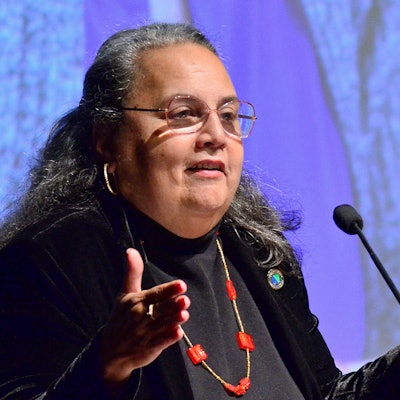What started with a small workshop during women’s history month turned into the first annual Latinas in Higher Education Conference held at Bronx Community College (BCC) in New York City during Hispanic Heritage Month.
 Dr. Daisy Cocco De Filippis, Dominican-American author and president of HSI Hostos Community College in the South Bronx.
Dr. Daisy Cocco De Filippis, Dominican-American author and president of HSI Hostos Community College in the South Bronx.
“Statistically, in higher education, less than 2% of full-time faculty members are Latinas,” said Leidy K. Pichardo, associate director of BCC’s college discovery program and chairperson of the Association of Latina Faculty and Staff (ALFS), a support organization that advocates for Latinx faculty, staff and students at BCC. Pichardo co-organized the event with ALFS vice chairperson and BCC chief information officer Luisa Martich in just four months—and they are already planning for next year.
“BCC is a Hispanic Serving Institution (HSI). That’s important. Fifty-eight percent of our student population is of Latino descent,” said Pichardo. “We wanted to expose the talent of our faculty and staff of BCC and other community colleges, the wonderful work that’s being done, on behalf of Latina faculty and staff.”
Keynote speaker Dr. Daisy Cocco De Filippis, Dominican-American author and president of HSI Hostos Community College (HCC) in the South Bronx, spoke about the inequity experienced by Latinx female faculty members, from their sheer lack of numbers to salary discrepancies.
“Look around. Look at our salaries—women tend to gravitate toward community colleges—the majority of women [academic] presidents in the nation are women,” said Cocco De Filippis. “And they get paid about $100,000 less than men who teach at universities and senior colleges.”
Event presenters offered attendees, virtual and present, ways to build a culture of belonging and retain Latinx women in science, technology, engineering, and math (STEM) fields, and shared how intrusive advising played a key role in tripling BCC’s three-year graduation rate from 7% to 20% in just a decade.





















